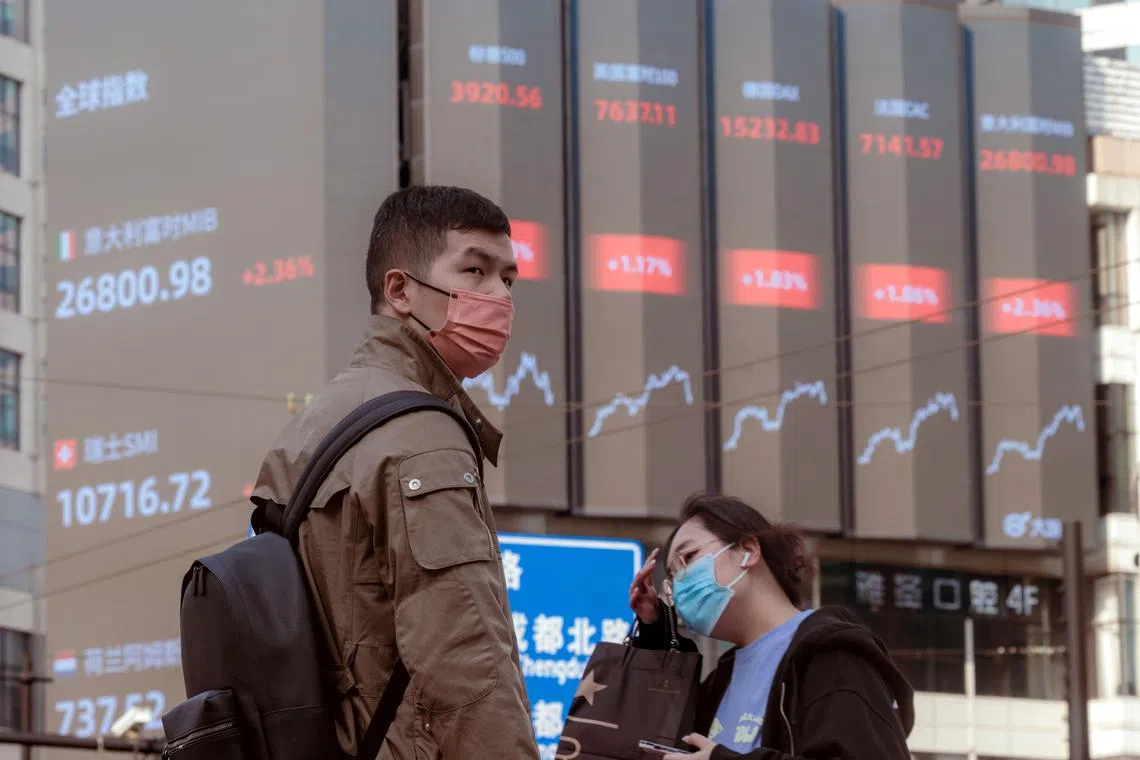Singapore bank stocks, Asia markets regain footing after multibillion-dollar rescues
Sign up now: Get ST's newsletters delivered to your inbox

The lifelines for troubled banks bolstered sentiment in battered stocks though concerns remain.
PHOTO: EPA-EFE
Follow topic:
TOKYO – Multibillion-dollar lifelines for troubled banks shored up investor confidence on Friday and bolstered sentiment in battered stocks, although concerns now centre on whether a global financial crisis has been fully averted.
Wall Street giants injected US$30 billion (S$40.3 billion) in deposits into First Republic Bank
The package came less than a day after Swiss bank Credit Suisse clinched an emergency central bank loan
Asian markets closed higher, tracking Wall Street’s relief rally overnight.
Japan’s Nikkei climbed 1.2 per cent while Hong Kong’s Hang Seng Index surged 1.6 per cent, and China’s blue chips rose 0.7 per cent.
In Singapore, the Straits Times Index closed up 0.9 per cent, with two of the trio of local banks staging a rebound.
Shares of DBS Bank, which lost 1.3 per cent on Thursday, closed unchanged at $32.55, but OCBC Bank rose 0.9 per cent to $12.26 while UOB jumped 1.9 per cent to $28.54.
S&P 500 futures were flat after major US stock indexes rallied hard on Thursday on easing fear of a global banking crisis.
On Thursday, First Republic Bank’s stock closed up 10 per cent on news of the rescue, but its shares fell 18 per cent in after-market trading, after the bank said it would suspend its dividend. The stock is down more than 70 per cent since March 6.
The past week has provided an unwelcome reminder of the inherent fragility of banking systems, said analysts at Capital Economics in a note to clients.
“There is still a great deal of uncertainty. The key question is whether this episode proves another relatively brief period of volatility that soon dies down, or the first tremors of a major banking crisis. At this stage, the answer is unknowable.”
Credit Suisse became the first major global bank to take up an emergency lifeline
Rapidly rising rates have made it harder for some businesses to pay back or service loans, increasing the chances of losses for lenders already worried about a recession.
Policymakers have tried to emphasise that the current turmoil is different from the global financial crisis 15 years ago, as banks are better capitalised and funds more easily available.
But underscoring the scale of stress in the financial system, data showed that US banks sought record amounts of emergency liquidity from the US Federal Reserve
US Treasury Secretary Janet Yellen said the country’s banking system remains sound, thanks to “decisive and forceful” actions following the collapse of Silicon Valley Bank.
The European Central Bank pressed forward with a 50 basis point rate hike on Thursday despite the turmoil in the financial markets, arguing that euro zone banks were resilient and that, if anything, the move to higher rates should bolster their margins.
Focus now swings to the Fed’s policy decision next week and whether it will stick with its aggressive interest rate hikes as it seeks to get inflation under control.
In Asia, the authorities in Singapore

